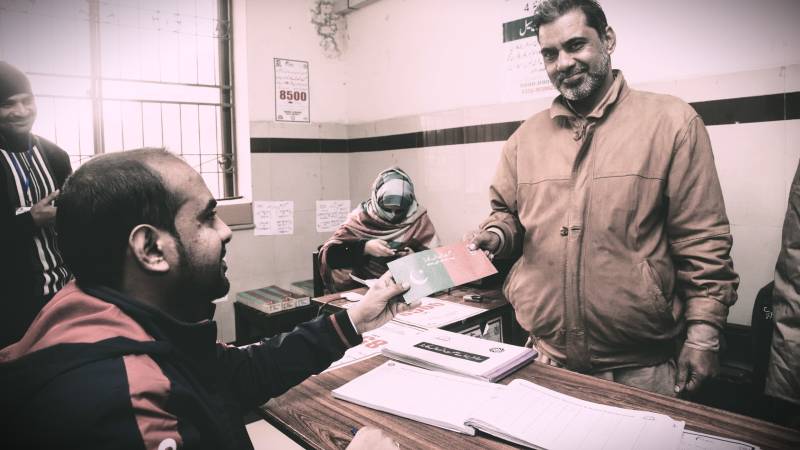
Reports emerged on Thursday that the caretaker Khyber Pakhtunkhwa government had suspended the provincial public health insurance scheme, Sehat Insaf Card. A fact-check by The Friday Times showed that the reports were not fully accurate.
On Thursday, former Khyber Pakhtunkhwa health minister and Pakistan Tehreek-e-Insaf (PTI) leader Taimur Khan Jhagra posted a message on social media platform X (formerly Twitter) that the interim provincial government had stopped the health insurance facility for the 40 million residents of the province.
"At a time of historic inflation, the health system should support the lower and middle classes and not kill them," he added while expressing his disappointment on the move.
A check by The Friday Times found that the provincial government had imposed certain limits on the programme but did not suspend it.
Khyber Pakhtunkhwa Advisor on Health Dr Riaz Anwar held a news conference in Peshawar on Thursday where he announced certain changes the interim provincial government was bringing to the programme. He was accompanied by the Khyber Pakhtunkhwa Health Secretary Mahmood Aslam Wazir.
"We had two options: either we suspend the programme, which would ruin the poor, or we find a way to continue it," he said, adding that they chose to make the programme more effective and strengthen it.
"We opted to approve certain amendments in the programme, not end it," he said.
He further explained that the changes to shorten the programme were being brought about because of the shrinking fiscal space after the annual expense on the programme increased from Rs30 billion annually to Rs39 billion.
"The provincial government still owes insurance companies around Rs17 billion," he said.
However, he asserted that the caretaker provincial government had not made changes to the law.
"The Sehat card is still universal [application], but it has been linked with data of the Benazir Income Support Programme," stated the provincial health secretary Mahmood Aslam Wazir.
He added that the caretaker government wanted to strengthen it and make the programme more effective.
Noting that in no country of the world do the rich benefit from facilities created for the poor, Wazir said that they have now divided beneficiaries of the programme into five categories.
In the first category, he said, those who earn less than Rs30,000 would be provided facilities. The second category includes those who earn Rs40,000 per month, and so on.
The provincial health secretary added that this way, the rich will support the poor.
"It is our desire that we maintain quality while minimising complaints," he said.
The official continued that under various laws, they will ensure the provision of at least ten beds in each hospital for cardholders.
Moreover, he said that they are expanding the programme by including the best hospital in every district, even if that hospital is better by just a single percentage compared to covered hospitals.
What did Jhagra say?
Meanwhile, Jhagra said that caretaker governments do not have the mandate to make major policy decisions and that the suspension of the Sehat Cards was a major policy change.
He also contradicted a statement by the Khyber Pakhtunkhwa Caretaker Health Minister Riaz Anwar that the provincial government does not have the funds to manage the programme.
"Khyber Pakhtunkhwa's balances should now top over Rs50 billion," he wrote, adding, "It's funny how the caretaker government could approve salary increments for bureaucrats worth Rs100 billion, including doubling the Secretariat allowances for secretariat employees. It's funny that they could approve Rs20 billion expenditure in a month on free atta (flour) for political purposes. But why should bureaucrats or unelected ministers worry about the 40 million people of Khyber Pakhtunkhwa?"
Jhagra continued that a proposal to give free health insurance to people who earned less than Rs31,0000 per month was cleared in the same cabinet meeting where the minimum wage was increased to Rs32,000.
When there is so much talk of investment, who will invest with a govt that only strikes contracts to go back on them, he said.
In an accompanying video message, he suggested that Dr Anwar, too, could not fully justify the move.
Jhagra continued that the programme has been shut down but then said that the programme has been limited to people entitled under the Benazir Income Support Programme.
He added that this was an illegal move even though it crutched on some laws to give it a semblance of legality.
"If they have taken a policy decision of segmentation and taking co-payment from some people and limiting it, a caretaker government has no right to take a policy decision," he said, adding that this is established in past practices and Election Act 2017 and that it can be challenged in court and that his party will challenge it.
Finally, the KP govt managed to stop the Sehat Card for 40 mln residents of KP. Some of the contradictions in the absurd, shocking and disappointing decision. At a time of historic inflation, the health system should support the lower and middle classes, and not kill them.
— Taimur Khan Jhagra (@Jhagra) September 7, 2023
a.… pic.twitter.com/GCI9D6QwsX

